Coal Miner Pays Visit to East Bay: “Putting the ‘Just’ in the Just Energy Transition”
Nick Mullins, a former underground coal miner whose family has lived in Appalachia for generations, spoke in the East Bay about the desperate conditions in those communities, helping us understand their hostility toward environmentalists and their support for Trump. He emphasized the importance of respecting local experience and leadership and focused on the absolute priority of jobs in a mono-economy where life is tightly controlled by the coal industry.
Nick, who is on a seven-week tour of the United States, spoke at both the Bobby Bowens Progressive Center in Richmond and the California Nurses Association/National Nurses United office in Oakland, addressing about a hundred people. His East Bay appearances were sponsored by ten local organizations, including No Coal in Oakland. The theme of his tour is “Putting the ‘Just’ in the Just Energy Transition.”
Nick said that no one he knew working in the mines would have taken that job if there were an alternative with comparable pay and benefits. But transitioning to an alternative economy will not be easy. The coal industry, eager to maintain a low-cost labor pool, actively blocks retraining programs and the region is not inviting for new businesses.
Nick outlined the history of Appalachia, beginning with runaway indentured servants who connected with indigenous inhabitants and learned many of their ways to survive without depending on the outside economy. The Civil War brought exploitation by the armies of both sides.
Once Appalachia’s rich mineral deposits were discovered, many residents sold their rights for pennies on the dollar to companies that have devastated the environment with mountain-top removal, runaway coal slurries, and chemicals leaching into drinking water. But most Appalachians don’t want to hear about these impacts as long as coal is the only feasible economy for the region. Climate change is also not a focus for organizing, but providing resources for health care could be unifying.
Appalachians hunt and farm for food—necessary for survival when money is tight, but also forms of resistance and of sustainability. Nick talked passionately about how the mining companies destroyed the unions that had created some safety and security for workers. When the industry declined because of falling prices in the 1990s, unionized mines were the first to be closed.
The anti-poverty programs of Kennedy and Johnson reinforced stereotypes of “hillbillies,” stigmatizing and dehumanizing Appalachians. Nick showed maps of the change from blue to red between 2000 and 2016 in the counties where mining predominates. He connects this political shift less to racism, which he attributes to lack of exposure, and more to the urban/rural divide and the relentless propaganda of the coal companies, including in public school curricula.
Environmentalists from other parts of the country have alienated many Appalachians through cultural differences, disrespect for their values, and lack of communication. To support Appalachians means first to listen to them, which we began by listening to Nick. He recommended reading Hegemony How-to: A Roadmap for Radicals by Jonathan Matthew Smucker for ideas on how to build a broad-based movement. He also encouraged sustainable initiatives like urban gardens and Transition Towns.
His talk was based on both his own experience and intensive study. At times he was visibly angry or sad. Audience members listened raptly, asked many questions, raised money, and encouraged Nick to run for office.
You can read more on Nick’s website and make donations at https://thoughtsofacoalminer.com/
Nick’s Oakland talk included old time Appalachian mountain music sung by the local group “Free Little Birds.” They sang a traditional song, “Little Birdie,” and “Which Side Are You On?” This anthem of class struggle was penned by Florence Reece in 1931 in Harlan County, while she and her children hid under their bed as strikebreakers barged into their home. The bloody history of the struggle for unionization in coal country still inspires us today:
“Us workers are in danger, from the very air we breathe,
Want a place to live, clean water to drink
Good jobs are what we need,
Stand up to corporate greed.”
Featured Photo: Mountain Top Removal by Chris Jordan-Bloch / Earthjustice
